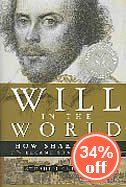 The prof who teaches the class that I'm TAing mentioned a book that she was reading a couple of weeks ago, and I decided to pick it up. It's not often that there are books published about Shakespeare that are non-academic and sound really interesting, so this one caught my attention. It's called Will in the World: How Shakespeare Became Shakespeare, and it's fascinating.
The prof who teaches the class that I'm TAing mentioned a book that she was reading a couple of weeks ago, and I decided to pick it up. It's not often that there are books published about Shakespeare that are non-academic and sound really interesting, so this one caught my attention. It's called Will in the World: How Shakespeare Became Shakespeare, and it's fascinating.
The book is written by Stephen Greenblatt, who I've been familiar with for a long time, as he's a big editor in the world of literature- he edited the Norton Anthology of English Literature (oh, memories of my first year survey course) and the Norton Shakespeare. So, he knows what he's talking about- which is really important for this book.
The premise of Will in the World is this. We really don't know all that much about Shakespeare. The main documentary evidence of his life are his baptismal registration, his will, some other smaller mentions of his parents, wife, and children, his playbills, his poetry, and his plays. As Greenblatt laments, just about every kind of guess, conjecture and just plain stab-in-the-dark have been taken at the non-literary information that we have about Shakespeare, and there's really not a lot more that can be done with it. There's nothing more that we can find out about him using it. There is, however, a lot more that we can find out (or surmise) about who Shakespeare really was using his plays and poetry, and this is what Greenblatt does.
Greenblatt fully admits that what he is doing in this book is largely conjecture (although with as much evidence as exists backing it up.) He's reading Shakespeare's plays & poems and conjecturing how what appears in his writing comes out of what he lived, thought and read. However, Greenblatt, being as skilled of a Shakespeare scholar as he is, makes his surmises really convincing. For example, I have no problem in believing that much of the intensity & genius of Hamlet comes out of the fact that Shakespeare's son Hamnet (which could be interchanged with Hamlet, according to Elizabethan spelling) had recently died, and his own father John was dying. Can you imagine Shakespeare continually writing, over and over, the name of his dead 11 year-old son as he wrote Hamlet, and infusing his grief into the play thereby?
I think the thing that I like the most about this book is that a) it really makes you think about what you've read of Shakespeare in a different way and b) it makes you feel like in some way, you know Shakespeare better. Something that totally surprised me(although it shouldn't have) is the fact that one of my favourite sonnets, #116, was written to a man! You'll know it to hear it--Let me not to the marriage of true minds/Admit impediments. Love is not love/ Which alters when it alteration finds,/ Or bends with the remover to remove etc. Greenblatt knows so much about Shakespeare that you're bound to be surprised with things that you didn't know. It's so fun! (And yes, I know that I'm a seriously big English geek, but you knew that already!)
One of the things that Shakespeare scholars always lament is the fact that we have so little access to him as a person, in the way that we have access to other authors. Greenblatt is trying to do that here, with as little information as we have, and I think he succeeds.
Tuesday, November 14, 2006
Stephen Greenblatt- Will in the World: How Shakespeare Became Shakespeare
Posted by Melissa Dalgleish at 9:15 a.m.
Labels: books, reviews, Shakespeare, Stephen Greenblatt
Subscribe to:
Post Comments (Atom)




5 comments:
Hi Melissa,
You might be surprised to discover just how many books are being written about Shakespeare these days. Check out "Shakespeare Wars" by Rosenbaum, "Sweet Swan of Avon" by Robin Williams, "Shakespeare After All" by Garber, "Invention of the Human" by Bloom, "1599 : A Year in the Life of Shakespeare" by Shapiro, "Shakespeare: A Biography" by Ackroyd...
They may not all meet your "not academic" criteria (especially Bloom :)), but they've all been published within the last year or two, and all have been written about in papers such as the NY Times. None of them is an academic thesis, they are all books you can find at your local Borders.
The man's a very popular subject!
Duane
http://suchshakespearestuff.blogspot.com
Thanks for the info, Duane. I do admit, I'm not totally up on my Shakespeare books, so thanks for the list. I'll have to take a closer look at some of them. I'm a Canadian modernist by trade, but I enjoy expanding my horizons. No academic can go wrong with Shakespeare!
Hey, you might also be interested in Shakespeare's Face (http://www.chapters.indigo.ca/books/item/books-978067697484/0676974848/Shakespeares+Face?ref=Search+Books%3a+'shakespeare's+face')
Thanks for the suggestion, I needed a reading suggestion. Think I'll take you up on it.
Hm...that link didn't go well. Just look it up on Chapters, Amazon, or whatever. It's by Stephanie Nolen.
Looks great...just found it on Chapter's & put a hold on it a the library. :)
Post a Comment